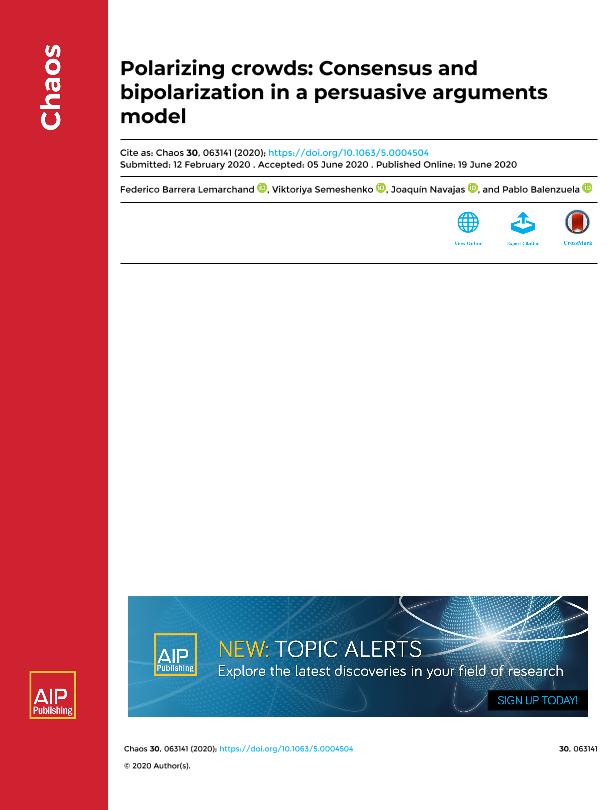Artículo
Polarizing crowds: Consensus and bipolarization in a persuasive arguments model
Fecha de publicación:
06/2020
Editorial:
American Institute of Physics
Revista:
Chaos
ISSN:
1054-1500
Idioma:
Inglés
Tipo de recurso:
Artículo publicado
Clasificación temática:
Resumen
Understanding the opinion formation dynamics in social systems is of vast relevance in diverse aspects of society. In particular, it is relevant for political deliberation and other group decision-making processes. Although previous research has reported different approaches to model social dynamics, most of them focused on interaction mechanisms where individuals modify their opinions in line with the opinions of others, without invoking a latent mechanism of argumentation. In this paper, we present a model where changes of opinion are due to explicit exchanges of arguments, and we analyze the emerging collective states in terms of simple dynamic rules. We find that, when interactions are equiprobable and symmetrical, the model only shows consensus solutions. However, when either homophily, confirmation bias, or both are included, we observe the emergence and dominance of bipolarization, which appears due to the fact that individuals are not able to accept the contrary information from their opponents during exchanges of arguments. In all cases, the predominance of each stable state depends on the relation between the number of agents and the number of available arguments in the discussion. Overall, this paper describes the dynamics and shows the conditions wherein deliberative agents are expected to construct polarized societies.
Palabras clave:
Formacion de opinion
,
Modelos de agentes
,
Intercambio de argumentos
Archivos asociados
Licencia
Identificadores
Colecciones
Articulos(IFIBA)
Articulos de INST.DE FISICA DE BUENOS AIRES
Articulos de INST.DE FISICA DE BUENOS AIRES
Articulos(IIEP)
Articulos de INST. INTER. DE ECONOMIA POLITICA DE BUENOS AIRES
Articulos de INST. INTER. DE ECONOMIA POLITICA DE BUENOS AIRES
Citación
Barrera Lemarchand, Federico Ulises; Semeshenko, Viktoriya; Navajas, Joaquín; Balenzuela, Pablo; Polarizing crowds: Consensus and bipolarization in a persuasive arguments model; American Institute of Physics; Chaos; 30; 6; 6-2020; 1-12
Compartir
Altmétricas




